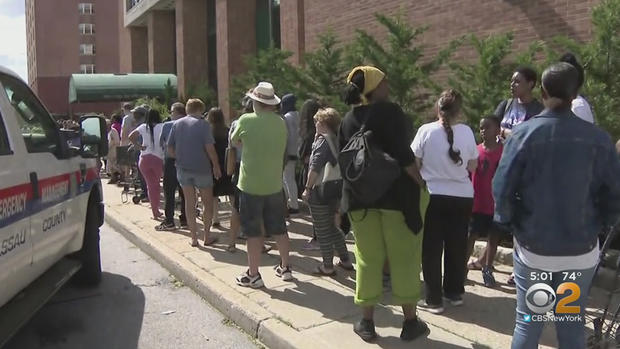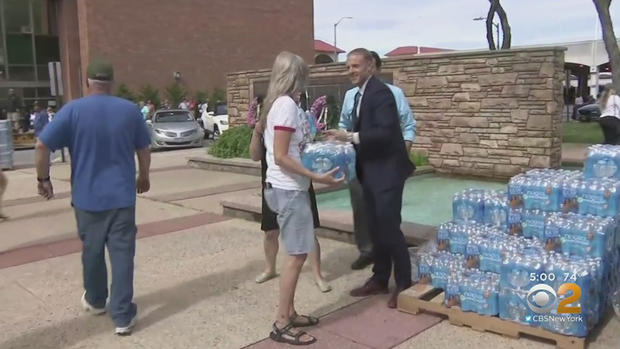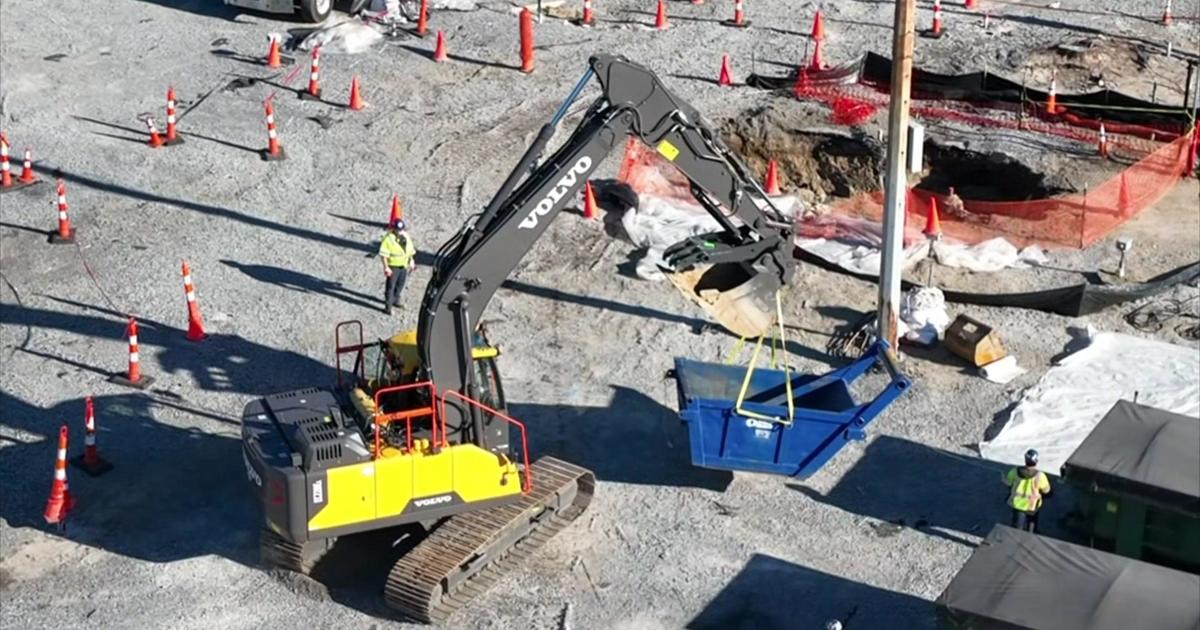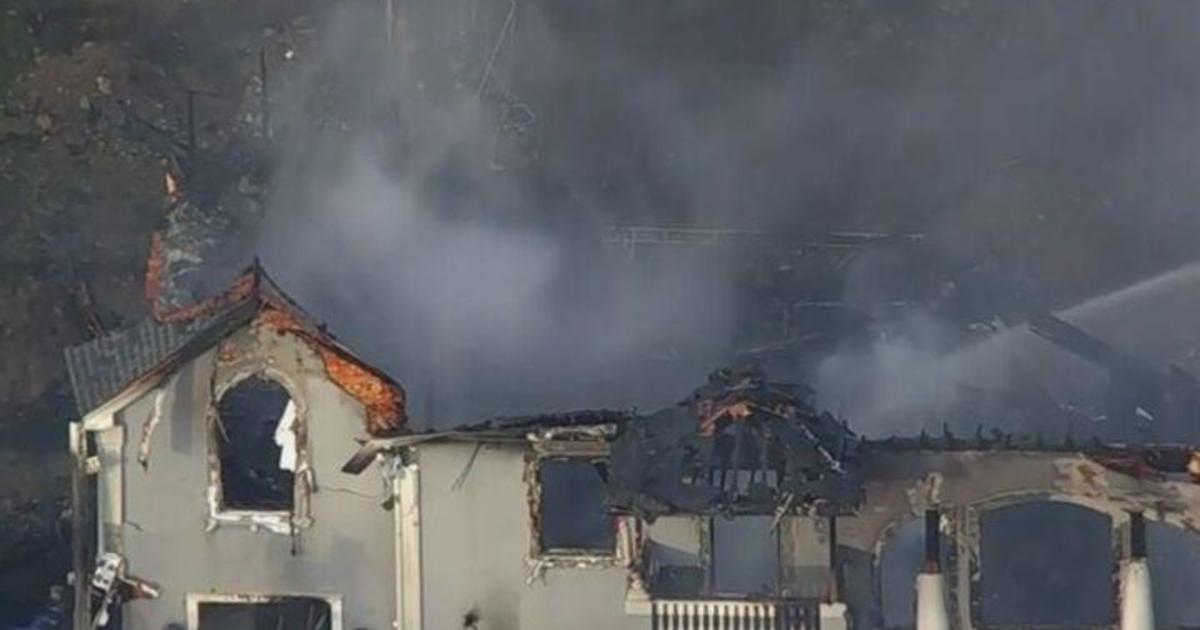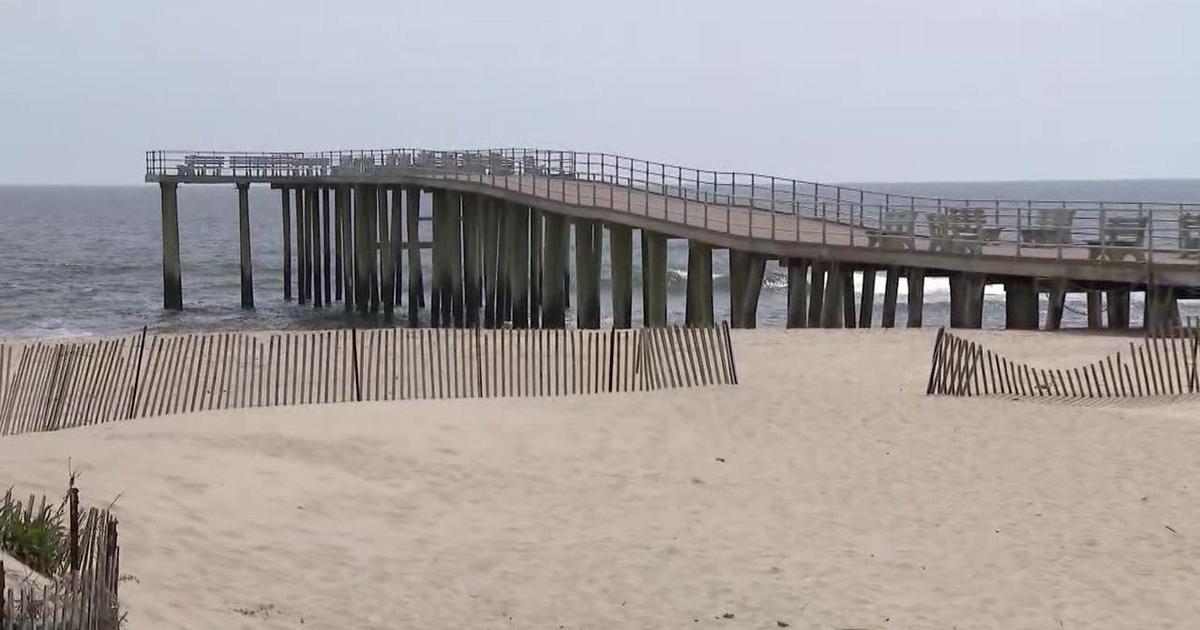Boil Order Continues After E. Coli Found In Long Beach Water Supply
LONG BEACH, N.Y. (CBSNewYork) -- The Nassau County Department of Health has issued a boil order in the city of Long Beach.
Standard tests conducted Friday morning detected strains of E. coli bacteria in a distribution sample collected from the Long Beach water system, according to County Executive Laura Curran.
As a result, county officials have ordered a boil water advisory for anyone that uses the City of Long Beach water system. Those 35,000 residents are cautioned to boil all water for one minute before using or to stick to bottled water until further notice.
A line was already forming Friday afternoon at one of three stations set up by the state where they handed out 33,000 bottles of water.
Gov. Andrew Cuomo says his office is prepared to send more bottled water Saturday and Sunday as needed.
Long Beach residents should use boiled or bottled water for drinking, making ice, preparing food, washing dishes and brushing teeth.
Web Extra: Boil Order Issued For City Of Long Beach After E. Coli Detected In Water --
In the meantime, Dr. Larry Eisenstein, the commissioner of the county health department, reassures the public that this is all precautionary.
"I want to be very clear. We have not identified an ill resident yet. We do not have a case of E. coli, and I don't believe we will," he said.
He cautions that all residents throw out any ice cubes they've made. Some further tips to stay safe include:
- Avoid ingesting water while bathing
- Supervise children and disabled individuals to ensure water is not ingested
- Use dishwasher with hot wash of 170 degrees or hand-wash dishes with boiled water
If you believe you have been infected by the bacteria, you're urged to contact authorities. E. coli exposure symptoms include diarrhea, abdominal cramps, nausea, vomiting and fever.
Long Beach Officials Address E. Coli Warning, Boil Order --
State Sen. Todd Kaminsky lives just two blocks from where the infected sample was collected.
"It's important that every parent and every citizen and every visitor in Long Beach heed this warning loud and clear," he said.
The alert is a concern for businesses, too.
"We had to throw out all the things that touched water. We had to boil water to cook with it ... We used a lot of disposable things today because it was too much to wash everything," diner owner Katarina Langis said. "Pride weekend is coming up. We were prepping for that and then this happens, so, you know, we have to make sure we have all our ducks in a row, otherwise it could be a drastic loss."
Surrounding communities are not affected. The boil water order is only for residents serviced by the Long Beach water system.
The health department and the City of Long Beach Water System are investigating the source of the contamination.
The boil water alert will remain in effect until further notice. Long Beach officials said Saturday that they are not expecting any updates from the health department until Sunday.
For further information, contact the City of Long Beach at (516) 431-1000.
------------------------------------
The following notice was put out Friday by the Nassau County Department of Health on Friday, June 21, 2019:
BOIL WATER NOTICES
Information for Residents and Homeowners
(6/20/2019- E. coli detection -City of Long Beach water system)
For basic boil water facts see the fact sheet "Basic Information for All Consumers". Detailed information for other consumers, such as food service establishments, is available from the NYS Department of Health or your local Health Department. If a "Do Not Use" notice is issued, additional precautions will be needed, contact your water supplier or local Health Department for guidance.
Q1 - Can I use my water for cooking? If a boil water notice was issued for your drinking water, any water used for food preparation or cooking should be boiled first or be from an acceptable alternate source (see Q13). Bring the water to a full rolling boil for at least one minute before adding the food item, like when you make pasta. If the water will be at a slight boil for a long time, then this is also protective. For example, you may be cooking beans or boiling chicken for 10 - 20 minutes.
Q2 - How should I wash fruit and vegetables and make ice? Fruits, vegetables, and any other foods that will not be cooked should be washed and rinsed with boiled (and then cooled) water or water from an acceptable alternate source. Similarly, ice should be made with either boiled water or water from an acceptable alternate source.
Q3 - Can I use my water for making baby formula or drinks? No, not without precautions! Any water used for baby food, formula, or making beverages must be boiled (and then cooled!) or be from an acceptable alternate source.
Q4 - Is potentially contaminated water safe for washing dishes? Hand-washed dishes: No! Use boiled (then cooled) water, water from an alternate source, or after washing with dish detergent rinse for a minute in a dilute bleach (1 tablespoon of unscented bleach per gallon of water). Allow dishes, cutlery, cups, etc. to completely air dry before use. Home dishwasher: Yes, if the hot wash is at least 170o F and includes a full dry cycle. However, most home dishwashers do not reach this temperature. If you are uncertain of the temperature of your dishwasher, rinse in dilute bleach and air dry as described for hand washed dishes.
Q5 - Is potentially contaminated water safe for washing clothes? Yes, it is safe to wash clothes as long as they are completely dried before being worn. However, increased turbidity that may occur during a boil water event may discolor clothing.
Q6 - Is potentially contaminated water safe for bathing and shaving? The water may be used by healthy individuals for showering, bathing, shaving, and washing as long as care is taken not to swallow water and avoid shaving nicks. People with open wounds, cuts, blisters or recent surgical wounds and people who are immunocompromised or suffer from chronic illness should use boiled water (then cooled) or water from an acceptable alternate source. Children and disabled individuals should be supervised to ensure water is not ingested. Sponge bathing is advisable, and bathing time should be minimized to further reduce the potential for ingestion.
Q7 - Can I brush my teeth with the water without boiling it? No! Any water you ingest or place in your mouth should be disinfected by boiling (and then cooled) or come from an acceptable alternate source.
Q8 - How should I wash my hands during a boil water notice/order? Generally, vigorous washing with soap and your tap water is safe for basic personal hygiene. If you are washing your hands to prepare food, you should use boiled (then cooled) water, bottled water, or water from another acceptable source.
Q9 - Can I use hand sanitizing lotion or wipes? Hand sanitizing wipes alone are not enough, especially to clean your hands for making food. Alcohol based sanitizers work against some common germs (like E. coli, and Salmonella) but may not be effective for Cryptosporidium and bacterium spores.
Q10 What symptoms can occur from Total Coliform and E. coli exposure? Bacteria such as E. coli can affect the gastrointestinal system, with or without fever, and result in: diarrhea, abdominal cramps, nausea, and vomiting. Most of these illnesses are not usually serious or life threatening except in the elderly, the very young or people who are immunocompromised. Skin contact can also lead to infection.
Q11 - What if I have already consumed potentially contaminated water? Illness is possible, especially for people that already have a chronic illness or may be immunocompromised. This is why boil water notices are issued. Anyone experiencing symptoms such as diarrhea, nausea, vomiting, and abdominal cramps should seek medical attention. These symptoms (with or without fever) are not unique to exposure to contaminated water and a doctor's involvement and medical testing are key components to identifying the cause of illness.
Q12 - What should homeowners do when the boil water notice is lifted?
• Flush household pipes/faucets first: run all your cold water faucets on full for at least five minutes each. If your service connection is long or complex (like in an apartment building) consider flushing for a longer period. Your building superintendent or landlord should be able to advise you on longer flushing times.
• Automatic ice makers: dump existing ice and flush by making and discarding three batches of ice cubes. Wipe down the ice bin with a disinfectant. If your water feed line to the machine is longer than 20 feet, increase to five batches.
• Hot water heaters, water coolers, in line filters, and other appliances with direct water connections or water tanks: run enough water to completely replace at least one full volume of all lines and tanks. If your filters are near the end of their life, replace them.
• Water softeners: run through a regeneration cycle.
• Reverse Osmosis (RO) units: replace pre filters, and check owner's manual.
• Replace other water filters, as they are disposable and may be contaminated. This applies especially to carbon filters and others that are near the end of their life.
Q13 - What is an acceptable alternate source for safe drinking water? Good alternate water sources include bottled water, water from another public water supply, water from a tanker provided by an emergency response agency, and water delivered by a NY State certified bulk water provider. Roadside springs are not a sure source of safe drinking water.
